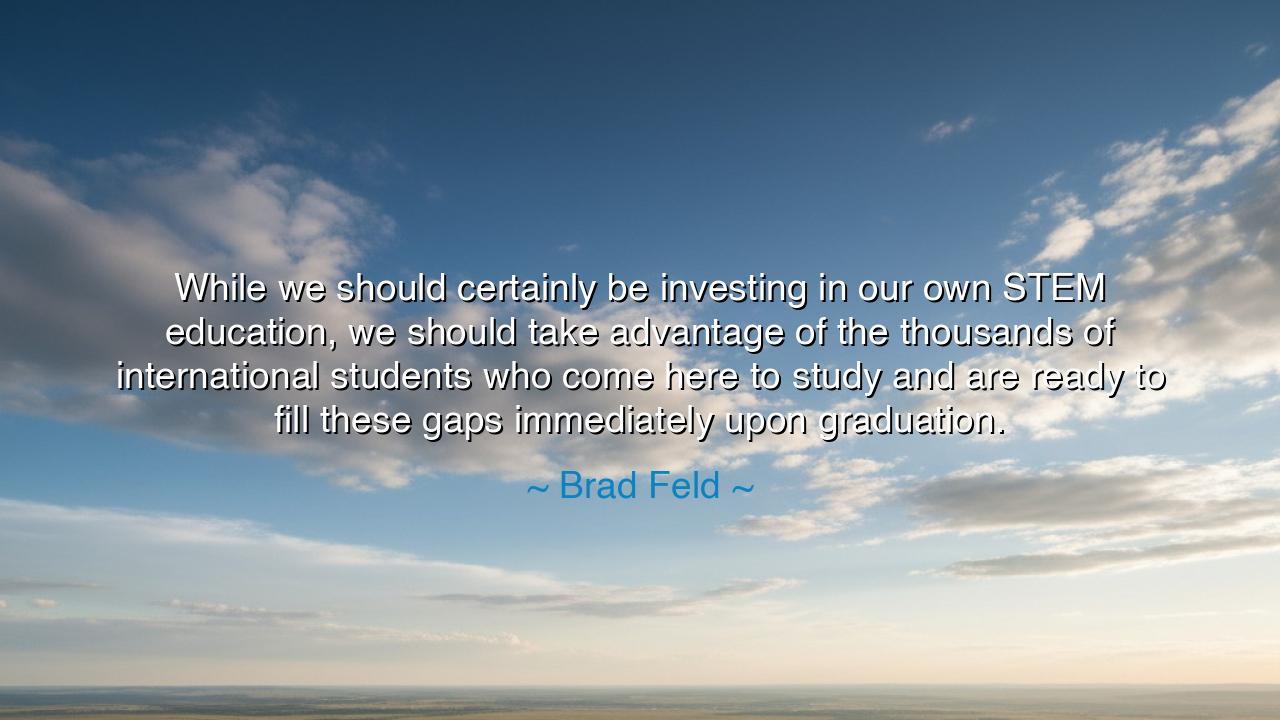
While we should certainly be investing in our own STEM education
While we should certainly be investing in our own STEM education, we should take advantage of the thousands of international students who come here to study and are ready to fill these gaps immediately upon graduation.






Hear, O seeker of knowledge and wisdom, the words of Brad Feld, an architect of innovation and a champion of progress: “While we should certainly be investing in our own STEM education, we should take advantage of the thousands of international students who come here to study and are ready to fill these gaps immediately upon graduation.” Though spoken in the language of industry and policy, these words pulse with a truth far older than the modern age — that the strength of a nation, like that of any soul, lies not in isolation, but in collaboration; not in fear of the stranger, but in welcome of the gifted.
The meaning of Feld’s words is both practical and profound. He calls upon his listeners to see education not merely as the cultivation of the self, but as the foundation of civilization. STEM education — science, technology, engineering, and mathematics — is the craft by which humankind shapes the future. Yet he warns that our own efforts, though noble, are not enough; that wisdom cannot grow in a vacuum. Across the seas come scholars, dreamers, and builders — international students — who bring with them not only their knowledge but the fire of their ambition. To turn them away would be to deny the very principle upon which human progress is built: that truth belongs to no single people, but to all who seek it.
The origin of Feld’s insight lies in the world he inhabits — the realm of invention, entrepreneurship, and discovery. He has seen firsthand the engines of innovation that power the modern age, and he has witnessed how often these engines are driven by minds from distant lands. In the laboratories of universities, in the start-up hubs and research centers of America, students from around the world labor beside their peers, bringing diverse perspectives, fresh energy, and an unyielding desire to build something better. Feld’s words echo an ancient wisdom: that civilizations rise when they draw strength from diversity, and they falter when they cling too tightly to pride.
Look, for example, to the story of the House of Wisdom in Baghdad during the golden age of Islam. There, in the ninth century, scholars of every tongue — Arab, Persian, Greek, Indian, Jewish, Christian — gathered under one roof to study, translate, and create. They took the ancient texts of Aristotle, Euclid, and Hippocrates and breathed new life into them, forging discoveries that would one day illuminate Europe and beyond. That great house was not built of walls and stones alone, but of ideas shared across borders. It was a temple to curiosity, proof that knowledge, when shared freely among nations, becomes the seed of human advancement.
Feld’s message carries this same eternal truth into our age. He reminds us that the international student is not a guest but a partner — one whose success strengthens the host nation as much as themselves. Their discoveries in medicine, their inventions in technology, their breakthroughs in science enrich not only the institutions that teach them but the societies that welcome them. In a world where challenges grow ever more complex — climate change, disease, inequality — no single mind or nation can bear the burden alone. The walls that divide must fall before the bridges of knowledge can stand.
And yet, Feld also speaks of investment in our own education, for hospitality must never replace responsibility. Each generation must sow its own field of learning, nurturing in its youth a hunger for discovery and the discipline to pursue it. To rely solely on others is to invite stagnation. True progress demands both — the cultivation of our own minds and the embracing of others who journey here to learn and to contribute. When these forces unite, a nation’s intellect becomes boundless, and its future secure.
So, O reader, take this as a lesson for your time: cherish learning wherever it is found. Honor those who come from afar to study beside you, for they are fellow pilgrims on the path of progress. If you are a student, learn not only to master your craft but to listen to those whose stories differ from your own. If you are a leader, open the gates of opportunity, knowing that in every foreign scholar lies a spark that may light the world anew.
For the wisdom of Brad Feld reminds us of an ancient truth: that knowledge is the one treasure that grows greater the more it is shared. Nations that hoard it wither, but those that give and receive in equal measure thrive. Let us, then, be builders of a new House of Wisdom — one not bound by walls, but by the fellowship of minds. And let every graduation, every collaboration, every act of learning be a declaration of faith in the greatest power humanity possesses: the power to think, to share, and to build the future together.






AAdministratorAdministrator
Welcome, honored guests. Please leave a comment, we will respond soon